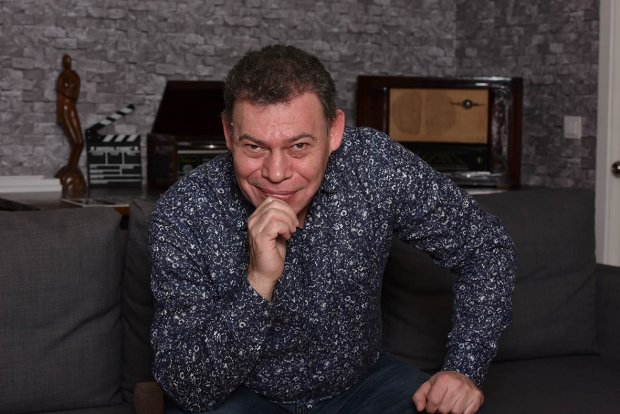On Saturday June 11 I made my first visit to the newly-opened Türk Telekom Opera Hall in the Atatürk Cultural Centre in Taksim Square. The occasion was a concert by the Istanbul State Symphony Orchestra that was part of the Beyoğlu Kültür Yolu Festivali, an event that translates as the Beyoğlu Culture Road or Beyoğlu Culture Route Festival. The works played and sung were Gülbaba, a symphonic poem by the Azeri composer İlyas Mirzayev, pictured above (this was the work’s Istanbul premiere); two arias by Cilea and Donizetti sung by the tenor Caner Akın; Rossini’s The Thieving Magpie Overture; and Liszt’s Piano Concerto No 2, in which the soloist was Gökhan Aybulus.
Walking into the rebuilt Atatürk Cultural Centre the first thing that catches one’s eye is a huge dark red globe covered in coruscations that seems to extend from ground level to the roof. The staff very courteously guided me to the place where I was to receive complimentary tickets for myself and my guests, and we duly entered the globe through one of the doors in its side. The feeling was that of walking into an Easter egg.
The Ankara premiere of Gülbaba took place on April 1 – make of that date what you will. Like the Istanbul premiere it was attended by His Excellency the Hungarian Ambassador. The reason for the Hungarian connection is that Gülbaba, a dervish about whom many legends have been woven, is said to have fallen during the Ottoman siege of Budin (aka Buda, one half of the present-day Hungarian capital) in 1541, and his Turkish-style octagonal tomb has been meticulously preserved by the government of Magyarország, the Land of the Magyars. I once had a satellite dish that allowed me to get Hungarian television, and the obvious respect for culture I witnessed (though I spoke not one word of the language) inspired in me a great deal of respect.
Several things made themselves apparent within the first minute of the concert. Number one: the symphonic poem Gülbaba was expertly orchestrated and highly dramatic, the effect being one in which alaturca themes and Azeri chords were combined in a style that was basically Prokofiev, but with an added 20% bias towards atonality. An unusual mixture, perhaps, but an intriguing one. Number two: the Istanbul State Symphony Orchestra has come a very long way indeed (thank God!) since I heard one of their previous incarnations mangle Mr Mirzayev’s Fourth Symphony (his Istanbul Symphony) in 2007. On that occasion there were several times when I thought the orchestra, under the baton of Alexander Rahbari, were going to break down completely, and would have to restart the piece. Number three: the acoustics in the Türk Telekom Opera Hall are dreadful. I do not know who designed it, but I can absolutely assure them that the sound made by the orchestra does not travel to the audience in sufficient volume. Indeed I have heard it said that none of the venues for orchestral music in Istanbul has acoustics that come even close to those of the Ahmed Adnan Saygun Arts Centre concert hall in Izmir, which remains unrivalled in Turkey. What a pity a golden opportunity to break the Istanbul jinx was passed up.
Gülbaba makes extensive use of percussion, bells, harp glissandi and brass sound. This is not to say, of course, that the string section is in any way neglected. It was a relief to see that they were well on top of their game from the word go, and that Mr Naci Özgüç, the conductor, was taking extreme care to ensure that the dynamics – especially in the pianissimo bits – were faithfully reproduced. Then the battle scene commenced, and there was a great deal of skilfully reproduced clashing of weapons, with alarums and excursions from the horns. It is not for nothing that among Mr Mirzayev’s teachers at the Moscow Conservatoire was master orchestrator Alfred Schnittke. Gülbaba’s demise was announced by a lady striking two small pieces of wood together (I wished the sound of the death blow had been bigger and louder, however), and this was followed by a mournful alaturca solo from the bass clarinet. Then Gülbaba mounted to heaven on the bridges of the violins, and the marshal mood was re-established with a march that put me in mind of Shostakovich: another of Mr Mirzayev’s teachers was Cevdet Hacıyev, a pupil of the man himself.
Towards the end of the piece, where the two main themes were scrupulously but by no means intrusively recycled (yes, I am an unrepentant formalist), the orchestral sound became more conventional. This actually came across not as a relapse into the banal, but as a pleasant and reassuring contrast. There was more than a hint of Debussy. The many variations of mood and volume that occur throughout the work were invariably well brought out by the conductor, who is to be congratulated on an excellent performance – as are the orchestra, who deserve a resounding Maşallah. I would single out the brass department, and especially the trombones, for special praise.
Afterwards there was a speech by Mr Adnan Polat, President of the Gülbaba Foundation, and presentations by him and the Hungarian Ambassador. The gifts handed out were in fact statues of lions, done in a silver-coloured metal. I have heard that Mr Polat is an ardent supporter of the Galatasaray football team, which has adopted the lion as its symbol. We shall now see what European audiences make of Gülbaba. They may well find it surprisingly professional, coming as it does from a country where musical form – and most especially the use of orchestral colour – are subjects that are at times neglected by composers.
Three of the items on the programme (arias by Mozart, Verdi and Delibes) had to be cancelled as Otilia İpek, the Romanian soprano who was to perform them, was indisposed. Accordingly, of the five scheduled operatic pieces, we heard only those sung by tenor Caner Akın. He treated us to an aria by the Italian composer Francesco Cilea (whose Wikipedia page has a wonderful photograph of him sporting a handlebar moustache) and one by Donizetti. I have to say that not all Mr Akın’s top A’s were comfortably reached, but he compensated for this with a good stage presence and sense of drama. The audience responded enthusiastically to his performance.
After this came Rossini’s The Thieving Magpie (La gazza ladra) Overture, put on the programme at the last minute owing to Ms İpek’s unfortunate indisposition. The amazing thing about this highly sophisticated piece, with its extremely effective (though at times somewhat feisty) orchestration, is that it was written as early as 1817, the year Beethoven was starting work on his Hammerklavier Sonata. Rossini was a composer for whom writing music was as easy as falling off a log. It is said that if the manuscript paper fell off the table while he was writing one of his melodies, he would not stoop to pick it up (being more than a little portly), but would pull a new tune out of the air and start writing again, using this new material, without even a moment’s pause. The Wikipedia entry for The Thieving Magpie tells us the following:
“Rossini wrote quickly, and La gazza ladra was no exception. A 19th-century biography quotes him as saying that the conductor of the premiere performance locked him in a room at the top of La Scala the day before the premiere with orders to complete the opera’s still unfinished overture. He was under the guard of four stagehands whose job it was to toss each completed page out the window to the copyist below.”
The Istanbul State Symphony Orchestra produced a polished performance. There was an enjoyable horn solo, and the orchestra managed the pauses well, with no raggedness whatever when they came in again after each break.
Here is The Thieving Magpie played by the Royal Philharmonic Orchestra, conducted by Sir Thomas Beecham. I owe a debt of gratitude to the Beecham family as the late Mr Derrick Beecham, Sir Thomas’s nephew, very kindly allowed me to practise on his grand piano when I was preparing for my piano teaching diploma at the Guildhall School of Music in the 1970s. (Mr Beecham and I were neighbours in Chiswick at the time.)
The second half of the programme continued the Hungarian theme with Liszt’s Piano Concerto No 2, composed in fits and starts between 1839 and 1861. Here are some programme notes by James M. Keller on the San Francisco Symphony website.
Having heard pianist Gökhan Aybulus perform in Shostakovich’s Piano Quintet in G minor with the Borusan Quartet at the Süreyya Opera House in Kadıköy on a snowy day many moons ago, I have acquired great respect both for his technique and for his discipline. On that occasion he never allowed himself even the faintest smidgeon of rubato. (After all, he was trained at the Moscow Conservatoire, where keeping strictly in time is regarded as a sine qua non of musical performance.) Shostakovich was given the Stalin Prize for his composition, and if I had been in the position to give any prizes, I would certainly have given the musicians a real doozy each for that showing in Kadıköy.
My opinion of Mr Aybulus’s interpretation of Romantic composers, however, is less flattering. He comes across as – dare I say it? – a trifle cold. I would surmise that he is at his best in works of a more intellectual nature. But whatever reservations I may have about the lack of emotional commitment, I cannot fault his technique in the Liszt concerto. The orchestra did well, too: after a somewhat ropey start (the bassoons’ intonation was a little off-colour), the woodwind department shone, thanks in part to the quality of Liszt’s writing for them. Afterwards, Mr Aybulus treated us to some Schubert and Rachmaninov as encores, and departed to well-deserved applause.
This rollicking performance of the Liszt concerto is by Jean-Yves Thibaudet, accompanied by the Orchestre national du Capitole de Toulouse under conductor Tugan Sokhiev:
One feature of Saturday's concert that I found especially pleasing was the behaviour of the audience: there were no telephonic interruptions and very little coughing during the mousey-quiet bits and the dramatic pauses. I got the feeling that everyone was fully focused on the music. And I have to say they were right: this was an exceptionally enjoyable concert, and many thanks to all concerned – the musicians, the organisers, the sponsors… and especially the polite staff at the entrance, who reacted calmly and efficiently when I arrived late and in a panic, the clock in the kitchen having stopped just as I was getting ready to set off, thus lulling me into a false sense of security. After the concert I changed its batteries, and felt that I myself had been given a boost – not quite as radical as a complete reset, perhaps, but the effect was still refreshing and rewarding.








